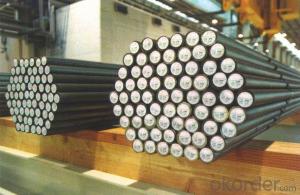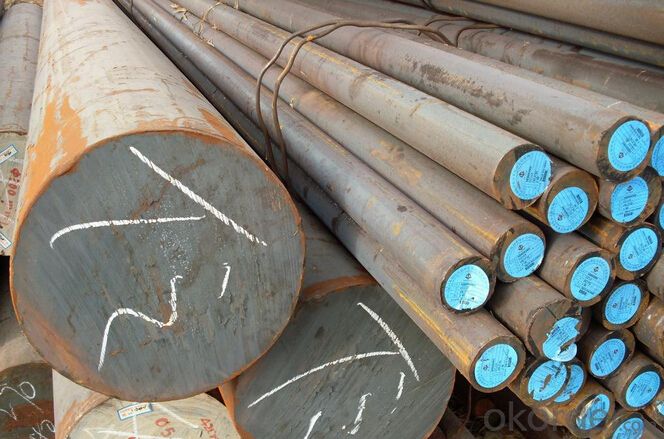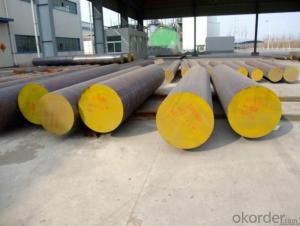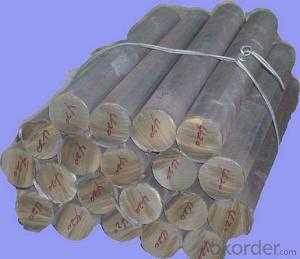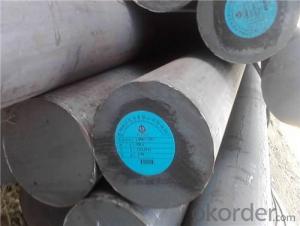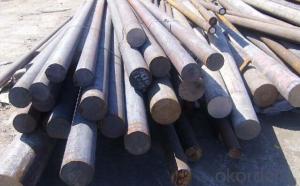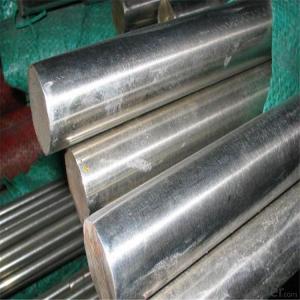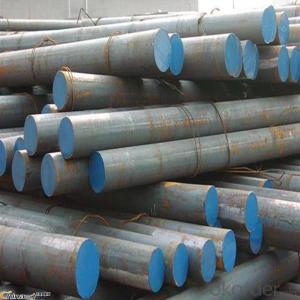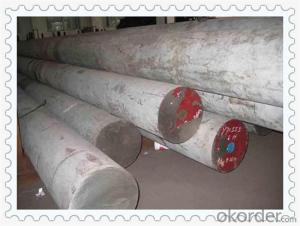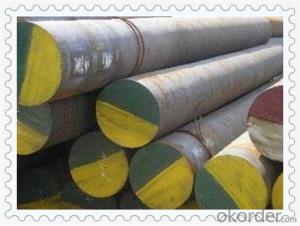Steel Bar 41cr4 40cr ASTM 5140 Round Bar
- Loading Port:
- China main port
- Payment Terms:
- TT OR LC
- Min Order Qty:
- 30 m.t.
- Supply Capability:
- 10000 m.t./month
OKorder Service Pledge
OKorder Financial Service
You Might Also Like
Specification
Steel Bar 41cr4 40cr ASTM 5140 Round Bar
Product Information:
1. Stock advantage
2. Completed size and material
3. Quick producing abilities
4. Flexible payment term
| Standard | GB/T699,GB/T700,GB/T702,GB/T3077 |
| Grade | alloy bar: 20Cr,40Cr,20CrMo, 35CrMo,42CrMo, |
| carbon bar:Q235B,20#,35#,45# | |
| Dimensions | Dia 10mm-1000mm |
| Place of Origin | China (Mainland) |
| Secondary Or Not | Non-secondary |
| Application | Structure bar, |
| Technique | Forged |
| Certification | API |
| Alloy Or Not | Is Alloy |
| packing | Hexagon bundle or bare bundle |
| Delivery | By container/train/lorry |
| Delivery time | 10days |
| Third Party Inspection | SGS/BV/LORDS |
Product Overviews:
| Product Name | Typical Grades | Diameter(mm) | Standard adopted |
| Carbon Steel | 20 (1020/S20C/C22) | Ø16-Ø300 | GB/SAE/JIS/DIN |
| 40 (1040/S40C/C40) | |||
| 45 (1045/S45C/C45) | |||
| Bearing Steel | GCr9 (51100/SUJ1) | Ø12-Ø250 | |
| GCr15 (52100/SUJ2/100Gr6) | |||
| GCr9SiMn (A485-Gr.1/SUJ3) | |||
| Cr-Mo Steel | 20Cr (5120/SCr420H/20Cr4) | Ø12-Ø250 | |
| 40Cr (5140/SCr440/41Cr4) | |||
| 42CrMo(4140/SCM440/42CrMo4) | |||
| Gear Steel | 20CrNiMo | Ø16-Ø600 | |
| 20CrMn(5115/SMnC420/20MnCr5) | |||
| 20CrNiMo(8620/SNCM220/20CrMiMo2) |
Product Show:

Our Advantages:
· Industry experience over 20 years.
· Shipment of goods -More than 70 countries worldwide.
· The most convenient transport and prompt delivery.
· Competitive price with best service.
· High technical production line with top quality products.
· High reputation based on best quality products.
With our experienced, enthusiastic and dynamic staffs, we assure to bring you the products with best quality, reasonable prices and good after-sales services under the motto: Friends First, Business After.
Communication, Experience, Expertise and Best efforts are our Promises to you.
- Q: What are the different forging techniques used for special steel?
- Some of the different forging techniques used for special steel include open die forging, closed die forging, and ring rolling. Open die forging involves shaping the steel by hammering it between flat dies or anvils. Closed die forging, also known as impression die forging, utilizes dies that contain specific shapes to mold the steel into the desired form. Ring rolling is a technique used to produce seamless rings by shaping the steel through a combination of axial compression and radial expansion. These forging techniques allow for the production of high-quality and complex special steel components with desired properties and shapes.
- Q: What are the main applications of special steel in the marine sector?
- Special steel is widely used in the marine sector for various applications. Some of the main applications include the construction of ship hulls, offshore structures, and marine equipment. The high strength and corrosion resistance properties of special steel make it ideal for withstanding the harsh conditions and corrosive environment of the sea. It is also used in the manufacturing of propeller shafts, marine engine components, and marine pipelines, ensuring durability and reliability in marine operations. Overall, special steel plays a crucial role in enhancing the safety, efficiency, and longevity of marine structures and equipment.
- Q: What are the specific requirements for special steel used in the railway wheel industry?
- The specific requirements for special steel used in the railway wheel industry include high strength, durability, and resistance to wear and fatigue. The steel must have excellent mechanical properties to withstand heavy loads and impact forces. It should also have good heat treatment characteristics to ensure proper hardness and toughness. Additionally, the steel must meet strict dimensional and geometrical specifications to ensure compatibility with the railway system.
- Q: How does special steel contribute to the transportation sector?
- The transportation sector relies heavily on special steel due to the numerous benefits it offers. Special steel plays a pivotal role in improving the efficiency, safety, and overall performance of vehicles. One primary advantage is its high strength-to-weight ratio, which allows manufacturers to reduce vehicle weight without compromising structural integrity. As a result, fuel efficiency improves, emissions decrease, and operating costs are lowered. Furthermore, special steel exhibits exceptional resistance to corrosion, making it especially advantageous in areas with severe weather conditions or exposure to saltwater, such as coastal regions or winter roadways where salt is used for ice melting. This corrosion resistance helps extend the lifespan of transportation infrastructure, such as bridges, tunnels, and railways, thus minimizing maintenance and replacement expenses. Another important aspect is the outstanding impact resistance of special steel. It can withstand heavy impacts and collisions, making it ideal for constructing vehicle frames, body panels, and safety components. This enhances passenger safety and reduces the likelihood of severe injuries during accidents. Special steel also plays a crucial role in producing high-performance engines and powertrains. Steel alloys with specific characteristics, such as high temperature and wear resistance, are utilized in manufacturing critical engine components like pistons, crankshafts, and camshafts. This ensures long-lasting and efficient engine performance, resulting in improved reliability and reduced downtime. Moreover, special steel contributes to advancements in electric and hybrid vehicles. Certain steel alloys possess unique properties that enable the development of lightweight battery packs, electric motor components, and charging infrastructure. These advancements facilitate the shift towards greener transportation options and help decrease the environmental impact of the sector. Overall, special steel has a profound influence on the transportation sector by providing lightweight, durable, corrosion-resistant, and impact-resistant materials. It not only enhances the performance and safety of vehicles but also contributes to the establishment of sustainable and efficient transportation systems.
- Q: What are the environmental impacts of producing special steel?
- The production of special steel has several environmental impacts. Firstly, the extraction of raw materials such as iron ore and coal leads to habitat destruction and loss of biodiversity. Secondly, the manufacturing process involves high energy consumption, contributing to greenhouse gas emissions and climate change. Additionally, the use of various chemicals and additives in steel production can result in water and soil pollution. Lastly, the disposal of waste materials, including slag and dust, can have detrimental effects on local ecosystems if not properly managed.
- Q: What are the applications of special steel in aerospace engineering?
- Special steel is widely used in aerospace engineering for various applications. It is used to manufacture critical components such as turbine blades, landing gear, and structural parts that require high strength, toughness, and resistance to extreme temperatures. Special steel alloys, such as stainless steel and nickel-based alloys, are used due to their excellent corrosion resistance, heat resistance, and ability to withstand harsh environments. These materials ensure the safety and reliability of aircraft, enabling them to operate under demanding conditions and meet stringent performance requirements.
- Q: What are the quality control measures for special steel?
- Quality control measures for special steel involve several key steps and processes to ensure that the final product meets the required standards and specifications. These measures typically include: 1. Raw Material Inspection: Thoroughly checking the quality and composition of the raw materials used in the production of special steel, such as ensuring the correct chemical composition and metallurgical properties. 2. Process Control: Implementing strict controls and monitoring throughout the manufacturing process to ensure consistent quality, such as maintaining precise temperature control during heating and cooling processes, controlling the rolling or forging parameters, and ensuring proper heat treatment. 3. Testing and Sampling: Conducting various tests and sampling techniques to assess the quality of the special steel, including mechanical tests (such as tensile strength, hardness), non-destructive testing (like ultrasonic or magnetic particle inspection), and chemical analysis. 4. Dimensional and Surface Inspection: Verifying that the dimensions and surface finish of the special steel conform to the required specifications, such as measuring length, diameter, straightness, and checking for any defects or irregularities. 5. Final Inspection and Certification: Performing a final inspection to ensure that the special steel meets all quality standards and customer requirements. This may involve visual examination, additional testing, and issuing necessary certifications or quality assurance documents. By implementing these quality control measures, manufacturers can ensure the reliability, durability, and consistent performance of special steel, making it suitable for various critical applications in industries like automotive, aerospace, energy, and construction.
- Q: What are the different construction grades of special steel?
- There are several different construction grades of special steel, including but not limited to ASTM A36, ASTM A572, ASTM A514, and ASTM A588. These grades vary in their mechanical properties and are specifically designed to meet different construction requirements, such as strength, durability, or corrosion resistance.
- Q: Is special steel suitable for manufacturing firearms?
- Yes, special steel is highly suitable for manufacturing firearms. Special steel alloys are specifically designed to possess exceptional properties such as high strength, hardness, and resistance to wear and corrosion. These characteristics are crucial for firearms as they need to withstand high pressures, recoil forces, and intense heat generated during firing. Special steel alloys, such as stainless steel or chrome-molybdenum steel, offer excellent tensile strength, allowing firearms to handle the immense pressure generated by the ignition of gunpowder. Moreover, the hardness of special steel ensures that the critical components, such as barrels and receivers, are durable and can withstand repeated use without deforming or cracking. Firearms also require resistance to wear and corrosion, as they are often exposed to harsh environments and various weather conditions. Special steel alloys are engineered to have superior resistance to both wear and corrosion, ensuring that the firearms remain functional and reliable even after prolonged use or exposure to moisture. Furthermore, special steel alloys can be easily machined and formed into complex shapes, allowing manufacturers to create intricate firearm components with precision. This versatility in manufacturing processes enables the production of firearms that meet stringent quality standards and precise specifications. In conclusion, special steel is unquestionably suitable for manufacturing firearms due to its exceptional strength, hardness, resistance to wear and corrosion, and ease of machining. These properties ensure the reliability, durability, and performance of firearms, making special steel an ideal material choice for this purpose.
- Q: What is the difference between stainless steel and special steel?
- Stainless steel is a type of steel that contains a minimum of 10.5% chromium content, which helps it resist corrosion and staining. On the other hand, special steel refers to a wide range of steel alloys that are specifically designed and manufactured for specific applications or purposes, such as high-strength, heat-resistant, or wear-resistant properties. So, while stainless steel is a specific type of steel with corrosion-resistant properties, special steel encompasses various alloys tailored for specific needs.
Send your message to us
Steel Bar 41cr4 40cr ASTM 5140 Round Bar
- Loading Port:
- China main port
- Payment Terms:
- TT OR LC
- Min Order Qty:
- 30 m.t.
- Supply Capability:
- 10000 m.t./month
OKorder Service Pledge
OKorder Financial Service
Similar products
Hot products
Hot Searches
Related keywords
